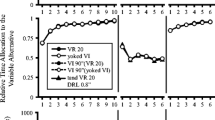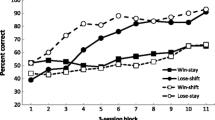Abstract
Five rats were trained under second-order schedules in which the completion of 10 short fixed intervals (2, 4, or 8 sec) produced food reinforcement, and then to yoked variable-ratio schedules, in which the individual ratios corresponded to the ratios of responses to reinforcement obtained under the second-order schedules. Changes from second-order to yoked variable-ratio schedules resulted in increases both in overall response rate and running rate for all rats. Response rates decreased whenever the second-order schedules were reinstated for all but one rat. Response rates under the second-order schedules were inversely related to the value of the fixed-interval component. Positively accelerated responding was evident within some interrein forcement intervals under the second-order schedules at all three fixed-interval values studied, but this pattern of responding was more pronounced at the higher fixed-interval values. The yoked variable-ratio schedules, by contrast, generated short postreinforcement pauses followed by uniformly high response rates, and no evidence of positively accelerated responding. To the extent that different rates of responding were maintained by the second-order and yoked variable-ratio schedules, responding can be considered sensitive to the temporal contingency imposed by the fixed-interval component of the second-order schedules.
Similar content being viewed by others
References
BAUM, W.M. 1981. Optimization and the matching law as accounts of instrumental behavior. Journal of the Experimental Analysis of Behavior, 36, 387–403.
CATANIA, A.C., MATTHEWS, T.J., SILVERMAN, P.J., & YOHALEM, R. 1977. Yoked variable-ratio and variable-interval responding in pigeons. Journal of the Experimental Analysis of Behavior, 28, 155–161.
CHURCH, R.M. 1964. Systematic effect of random error in the yoked control design. Psychological Bulletin, 62, 122–131.
FERSTER, C.B., & SKINNER, B.F. 1957. Schedules of reinforcement. New York: Appleton-Century-Crofts.
KELLEHER, R.T. 1966. Chaining and conditioned reinforcement. In W.K. Honig (Ed.). Operant behavior. Areas of research and application. New York: Appleton-Century-Crofts.
KILLEEN, P. 1969. Reinforcement frequency and contingency as factors in fixed-ratio behavior. Journal of the Experimental Analysis of Behavior, 12, 391–395.
KINTSCH, W. 1965. Frequency distributions of interresponse times during Vi and Vr reinforcement. Journal of the Experimental Analysis of Behavior, 8, 347–352.
MATTHEWS, B.A., SHIMOFF, E., CATANIA, A.C., & SAGVOLDEN, T. 1977. Unin-structed human responding: Sensitivity to ratio and interval contingencies. Journal of the Experimental Analysis of Behavior, 27, 453–467.
RICHARDSON, W.K. 1973. A test of the effectiveness of the differential-reinforcement-of-low-rate schedule. Journal of the Experimental Analysis of Behavior, 20, 385–391.
RIDER, D.P. 1977. Interlocking schedules: The relationship between response and time requirements. Journal of the Experimental Analysis of Behavior, 28, 41–46.
WILLIAMS, D.R. 1968. The structure of response rate. Journal of the Experimental Analysis of Behavior, 11, 251–258.
ZEILER, M. 1977. Schedules of reinforcement: The controlling variables. In W.K. Honig & J.E.R. Staddon (Eds.). Handbook of operant behavior. Englewood Cliffs, NJ: Prentice-Hall.
ZURIFF, G.E. 1970. A comparison of variable-ratio and variable-interval schedules of reinforcement. Journal of the Experimental Analysis of Behavior, 13, 369–374.
Author information
Authors and Affiliations
Additional information
This research was conducted at The University of Kansas. Funds were provided in part by the Bureau of Child Research, the Department of Human Development, and General Research Fund Grant #3492-60-038 from the University of Kansas, and by Grant 2 S06 RR08073-10A1 funded by the Division of Research Resources and the National Institute of Mental Health, through the University of Hawaii at Hilo. I am grateful to Edward K. Morris for his helpful comments on the original manuscript.
Rights and permissions
About this article
Cite this article
Rider, D.P. Sensitivity of Responding to Simple vs. Complex Contingencies of Reinforcement. Psychol Rec 32, 365–374 (1982). https://doi.org/10.1007/BF03394795
Published:
Issue Date:
DOI: https://doi.org/10.1007/BF03394795




